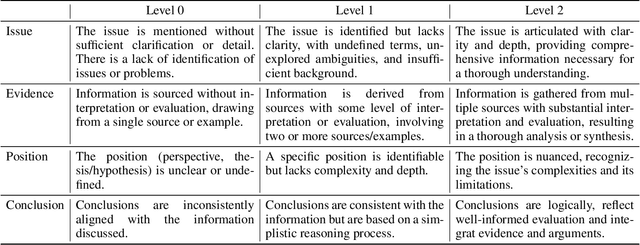Shengxin Hong
"My Grade is Wrong!": A Contestable AI Framework for Interactive Feedback in Evaluating Student Essays
Sep 11, 2024



Abstract:Interactive feedback, where feedback flows in both directions between teacher and student, is more effective than traditional one-way feedback. However, it is often too time-consuming for widespread use in educational practice. While Large Language Models (LLMs) have potential for automating feedback, they struggle with reasoning and interaction in an interactive setting. This paper introduces CAELF, a Contestable AI Empowered LLM Framework for automating interactive feedback. CAELF allows students to query, challenge, and clarify their feedback by integrating a multi-agent system with computational argumentation. Essays are first assessed by multiple Teaching-Assistant Agents (TA Agents), and then a Teacher Agent aggregates the evaluations through formal reasoning to generate feedback and grades. Students can further engage with the feedback to refine their understanding. A case study on 500 critical thinking essays with user studies demonstrates that CAELF significantly improves interactive feedback, enhancing the reasoning and interaction capabilities of LLMs. This approach offers a promising solution to overcoming the time and resource barriers that have limited the adoption of interactive feedback in educational settings.
ArgMed-Agents: Explainable Clinical Decision Reasoning with Large Language Models via Argumentation Schemes
Mar 10, 2024Abstract:There are two main barriers to using large language models (LLMs) in clinical reasoning. Firstly, while LLMs exhibit significant promise in Natural Language Processing (NLP) tasks, their performance in complex reasoning and planning falls short of expectations. Secondly, LLMs use uninterpretable methods to make clinical decisions that are fundamentally different from the clinician's cognitive processes. This leads to user distrust. In this paper, we present a multi-agent framework called ArgMed-Agents, which aims to enable LLM-based agents to make explainable clinical decision reasoning through interaction. ArgMed-Agents performs self-argumentation iterations via Argumentation Scheme for Clinical Decision (a reasoning mechanism for modeling cognitive processes in clinical reasoning), and then constructs the argumentation process as a directed graph representing conflicting relationships. Ultimately, Reasoner(a symbolic solver) identify a series of rational and coherent arguments to support decision. ArgMed-Agents enables LLMs to mimic the process of clinical argumentative reasoning by generating explanations of reasoning in a self-directed manner. The setup experiments show that ArgMed-Agents not only improves accuracy in complex clinical decision reasoning problems compared to other prompt methods, but more importantly, it provides users with decision explanations that increase their confidence.
 Add to Chrome
Add to Chrome Add to Firefox
Add to Firefox Add to Edge
Add to Edge